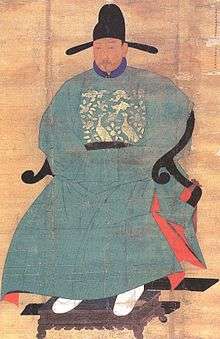Shin Suk-ju
Shin Suk-ju (Korean: 신숙주, hanja: 申叔舟; August 2, 1417 – July 23, 1475) was a Korean politician during the Joseon Dynasty. He served as Prime Minister from 1461 to 1466 and again from 1471 to 1475.
Shin was an accomplished polyglot, and was particularly well educated in the Chinese language.[1] He served as a personal linguistic expert to King Sejong, and was intimately involved in the creation and application of the Korean alphabet known in modern times as Hangul.[1] Sin used the newly created hangul system to create an accurate transcription of spoken Mandarin Chinese in 15th century Ming dynasty China.[1][2]
These transcriptions haven proven accurate and reliable, and his transcriptions are now "an invaluable source of information on the pronunciations of Ming-era [Mandarin]."[1]
See also
References
- Footnotes
- 1 2 3 4 Handel (2014): 294.
- ↑ Coblin, W. South (2000), "A Brief History of Mandarin", Journal of the American Oriental Society 120 (4): 537–552 JSTOR 606615
- Works Cited
- Handel, Zev (2014). "Why Did Sin Sukju Transcribe the Coda of the Yào 藥 Rime of 15th Century Guānhuà with the Letter ㅸ <f>?". Studies in Chinese and Sino-Tibetan Linguistics: Dialect, Phonology, Transcription and Text, eds. Richard VanNess Simmons, Newell Ann Van Auken. Language and Linguistics Monograph Series 53. Taipei: Academia Sinica, pp. 293–308.
External links
 |
Wikisource has original text related to this article:
|
